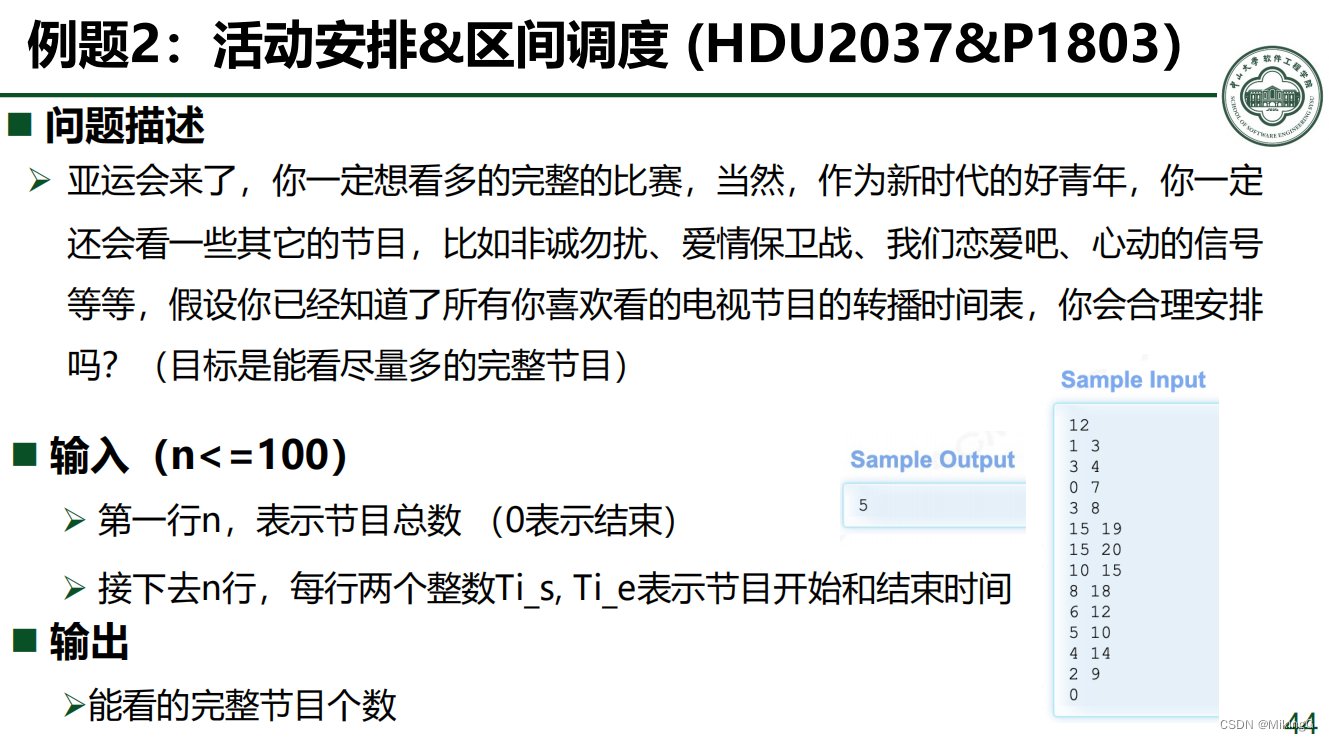A-Combine Fruit
Problem Description

Complete Code
#include<iostream>
#include<queue>
using namespace std;
int main()
{
int n;
int x;
int res=0;
priority_queue<int,vector<int>,greater<int>> heap;
// value_type,container_type,compare.
// the compare defaults to less<value_type>
cin>>n;
while(n--){
cin>>x;
heap.push(x);
}
while(heap.size()>1){
int top1=0,top2=0;
top1=heap.top();
heap.pop();
top2=heap.top();
heap.pop();
res+=top1+top2;
heap.push(top1+top2);
}
cout<<res<<endl;
}Code Explanation
The train of thought is to combine the two lightest fruit groups after using a priority_queue to sort them until there is only one group left.
B-Segment Overlap
Problem Description

Complete Code
#include<iostream>
#include<algorithm>
#include<vector>
using namespace std;
int main(){
// input
int n,start,end;
vector<pair<int,int> > contest;
cin>>n;
for(int i=0;i<n;i++){
cin>>start>>end;
contest.push_back(make_pair(end,start));// reverse to avoid a comp func for sort
}
sort(contest.begin(),contest.end());
int count=1;
int tmp=0;
for(int i=1;i<n;i++)
{
if(contest[i].second>=contest[tmp].first){
count++;
tmp=i;
}
}
cout<<count<<endl;
}
Code Explanation
An ingenious design is that reversing the pair order avoids a comp function for sort.
tmp represents the current contest. We need to finish this contest before the start time we choose next. The application of the greedy algorithm in this problem is to choose the contest with the earliest end time.
C-Milk the cow
Problem Description

Complete Code
#include<iostream>
#include<algorithm>
#include<queue>
#define PII pair<int,int> // the end time of cow in this stall, index of stall
using namespace std;
struct cow{
int start;
int end;
int index;
};
cow cows[10000];
bool comp(cow a,cow b){
return a.start<b.start;
}
int res[50001];
int main(){
int n;
cin>>n;
for(int i=0;i<n;i++)
{
cin>>cows[i].start>>cows[i].end;
cows[i].index=i;
}
priority_queue<PII,vector<PII>,greater<PII> > heap;
sort(cows,cows+n,comp);
int stallCount = 0; // Maintain a separate stall counter
for(int i=0;i<n;i++){
cow tmp=cows[i];
// if there is no stall or the earliest end time of cow >= that start time of this cow, add a new stall in order to put the cow in it
if(heap.empty()||heap.top().first>=tmp.start){
stallCount++; // Increase stall count
PII stall;
stall.first=tmp.end; // end time of this cow
stall.second=stallCount; // Use stallCount as index
res[cows[i].index]=stall.second;
heap.push(stall);
}
// if there is a stall to contain this cow, this time is updated to the cow's end time.
else{
PII stall=heap.top();
heap.pop();
stall.first=tmp.end;
res[cows[i].index]=stall.second;
heap.push(stall);
}
}
cout<<heap.size()<<endl; //heap size represents the count of stall
for(int i=0;i<n;i++)
cout<<res[i]<<endl; // No need to add 1 since we are already using 1-based indexing for stalls
}
Code Explanation
see comments for details.
D-Split cards equally
Problem Description

Complete Code
#include<iostream>
using namespace std;
int main(){
int n;
while(cin>>n&&n){
int avg=0,res=0;
int num[110]={0};
for(int i=0;i<n;i++){
cin>>num[i];
avg+=num[i];
}
avg/=n;
for(int i=0;i<n;i++)
num[i]-=avg;
int i=0,j=n-1;
while(num[i]==0&&i<n)
i++;
while(num[j]==0&&j>=0)
j--;
while(i<j){
num[i+1]+=num[i];
num[i]=0;
res++;
i++;
while(num[i]==0&&i<j)
i++;
}
cout<<res<<endl;
}
}Code Explanation
A very TRICKY problem. (I learned this word from WYL this morning)
There is no need to solve the exact way to transfer cards. We just need to know whether there is a transfer or not. So it is enough to know whether is zero or not. If the num[i] is negative, it means that it need the other side to give card to it. If positive, it will give cards to others.
Give some examples to clarify the concept "transfer".
Suppose that:
1 0 3 100
they become -25 -26 -23 74 after num[i]-=avg
in the first Wiley cycle:0 -51 -23 74, res=1.
the leftest 0 means that it doesn't need be given cards after one time.
Another simpler example:
1 5 2 4
afer -=avg: -2 2 -1 1
1 cycle: 0 0 -1 1, res =1. one transfer solve to cards heap.
2 cycle: 0 0 0 0, res =2.
E- Delete Number
Problem Description

Complete Code
#include<iostream>
#include<string>
using namespace std;
int main() {
string n;
int s;
cin >> n >> s;
for(int j = 0; j < s; ++j) {
int i = 0;
while(i < n.length() - 1 && n[i] <= n[i + 1]) {
i++;
}
n.erase(n.begin() + i);
}
while(n.size() > 1 && n[0] == '0') {
n.erase(n.begin());
}
cout << n << endl;
}
Code Explanation
At each step, always choose the smallest remaining number to remove, that is, search in descending order from the most significant digit to the least significant digit. If the digits are in increasing order, then remove the last digit; otherwise, remove the first character of the decreasing interval.
Note that use n.erase(begin()+i) instead of n.erase(i);
The erase function need a iterator instead of a direct index.